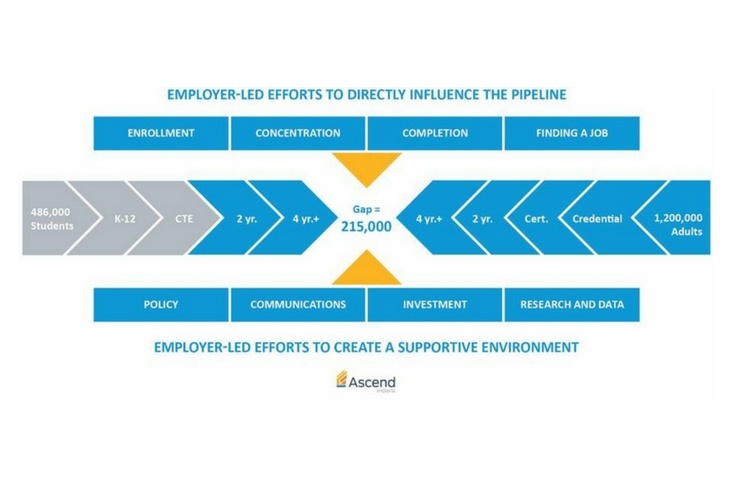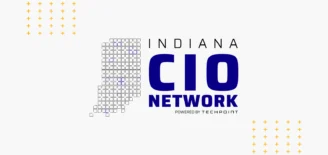Central Indiana Corporate Partnership unveils new workforce initiative
On October 25, the Central Indiana Corporate Partnership (CICP) unveiled the new brand, focus and fundraising efforts for its regional workforce development initiative – Ascend Indiana. This cross-sector, industry-led organization collaborates with corporate, education, and community partners to identify and address challenges within the talent pipeline.
Lilly Endowment Inc. has provided a grant of $5 million to the CICP Foundation to support the first three years of Ascend’s operations. Additional funding and grants totaling nearly $2 million have been received from organizations including the Joyce Foundation, Indiana Department of Workforce Development (DWD), USA Funds, Lumina Foundation, Eli Lilly and Co. Foundation, Central Indiana Community Foundation, and the Glick Family Foundation.
Ascend Indiana’s research shows that the current supply of skilled talent and employer demand in Central Indiana are misaligned, with demand outstripping supply.¹ Within five years, an estimated 62 percent of workers will require some form of post-secondary credential.² However, only 42 percent of the population in Central Indiana has attained an adequate level of education, highlighting a gap of 215,000 adults.³
Ascend Indiana has spent the past year conducting in-depth research and engaging key stakeholders to understand the workforce landscape in Central Indiana. As a result, it has outlined four areas of focus: engage employers, identify and connect talent, build talent pipelines and inform public policy. Ascend is CICP’s first cross-sector initiative that is addressing Indiana’s crucial employment needs.
“The advanced industries, such as life sciences, technology and advanced manufacturing, account for more than 96,000 jobs in Indianapolis,” David Johnson, president and CEO of the Central Indiana Corporate Partnership, said. “These are typically jobs that require some type of STEM-related skill or credential, pay well above the regional norm, and make an impressive contribution to productivity in our 21st-century economy. As such, they represent some of our best opportunities to promote innovation and economic growth, and we need to be able to meet the rising need for these jobs with tailored and practical strategies. Ascend’s work will help connect our skilled talent with employers’ needs,” he added.
The Central Indiana Corporate Partnership (CICP) was formed in 1999 to bring together the chief executives of Central Indiana’s prominent corporations, foundations and universities in a strategic and collaborative effort dedicated to the region’s continued prosperity and growth. To advance this mission, CICP sponsors six key economic development initiatives, AgriNovus Indiana, Ascend Indiana, BioCrossroads, Conexus Indiana, Energy Systems Network and TechPoint, each of which addresses challenges and opportunities unique to its respective area: agriculture innovation, workforce development, life sciences, advanced manufacturing and logistics, energy technology and information technology. CICP is also spearheading the development of the 16 Tech innovation community in downtown Indianapolis. To learn more about CICP, visit www.cicpindiana.com.
For more information or to get involved with Ascend Indiana, visit AscendIndiana.com.
1 Central Indiana is defined as the following counties: Boone, Brown, Hamilton, Hancock, Hendricks, Johnson, Madison, Marion, Morgan, Putnam, and Shelby counties.
2 Carnevale, A., Rose, S. & Hanson, A. (2012). Certificates: Gateway to Gainful Employment and College Degrees. Washington, DC: Georgetown University, Center on Education and the Workforce. Retrieved from http://cew.georgetown.edu/ certificates. Post-secondary credentials include certificates, Associate’s, Bachelor’s degrees or higher.
3 Explanation of gap calculation: There are 1.2 M working age adults, aged 18 – 64, in Central Indiana. A goal of 60 percent post-secondary educational attainment means we need 720,000 post-secondary educated workers. 700,000 (57.9%) of Central Indiana’s working age population do not have post-secondary credentials. 505,000 (42.1%) of Central Indiana’s workers have at least a Bachelor’s degree (29.4%), an Associate’s degree (8%), or certificate (5%). This leaves a gap of nearly 215,000 workers (17.9%) of total working age population that need to attain post-secondary credentials to achieve the state’s 60% goal.






































